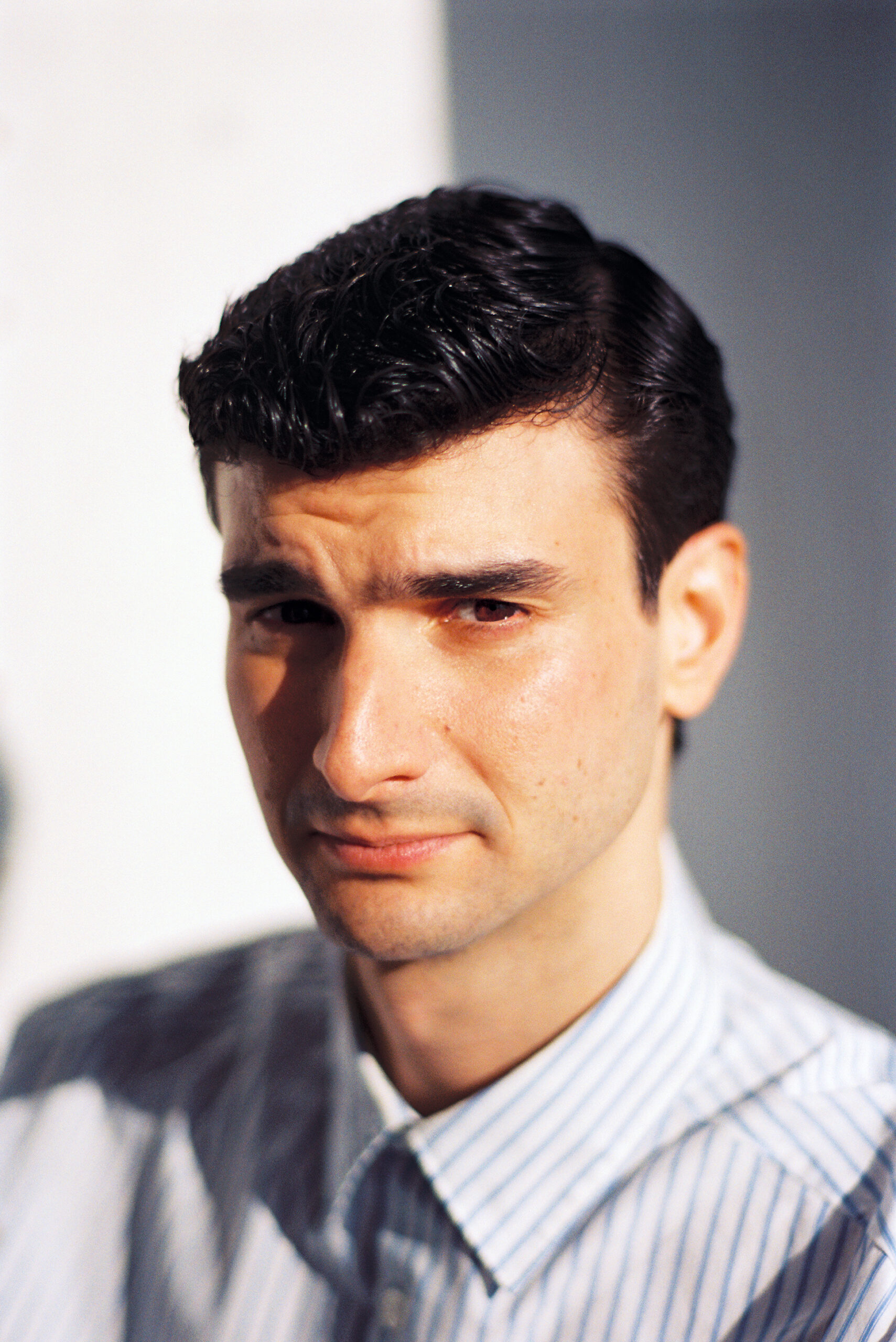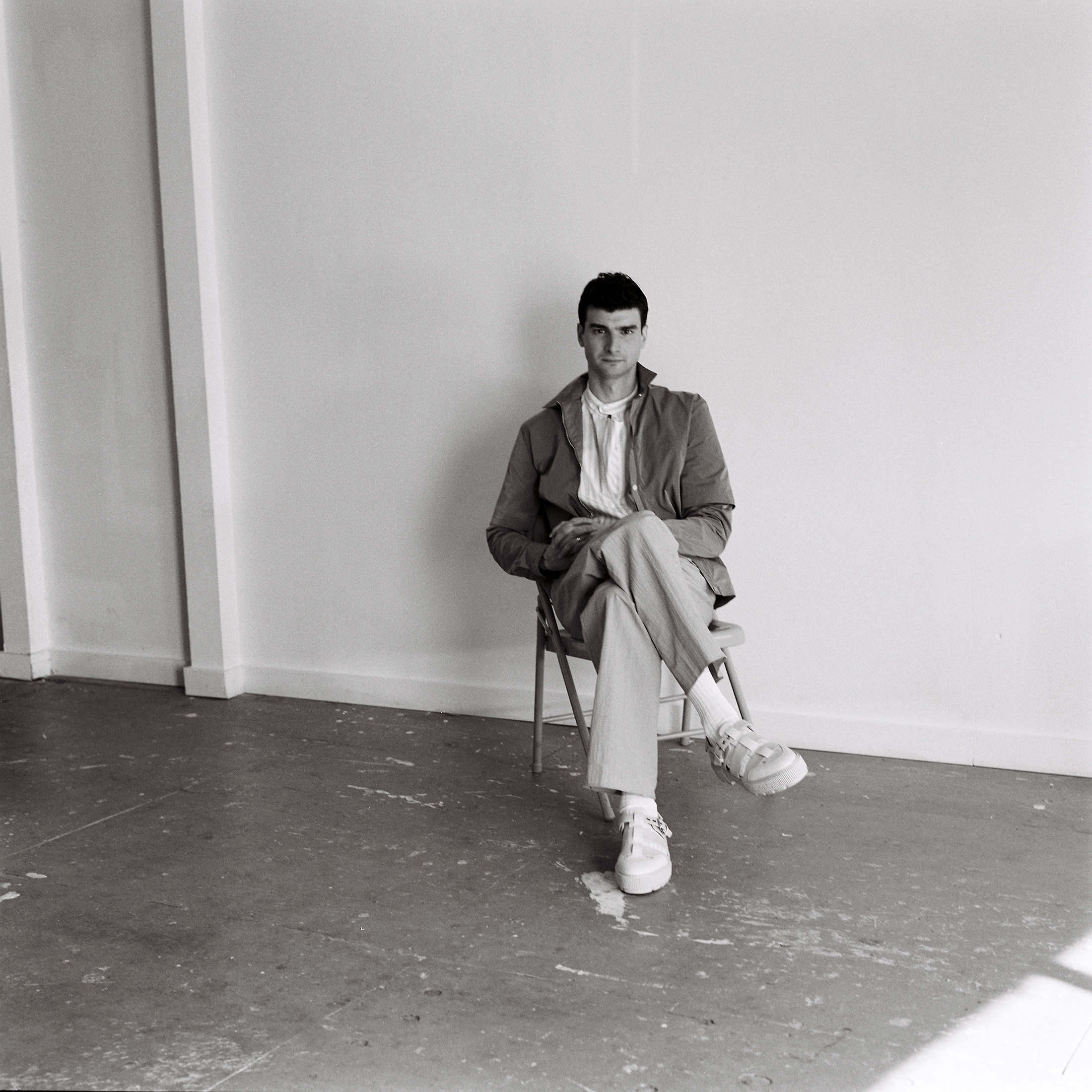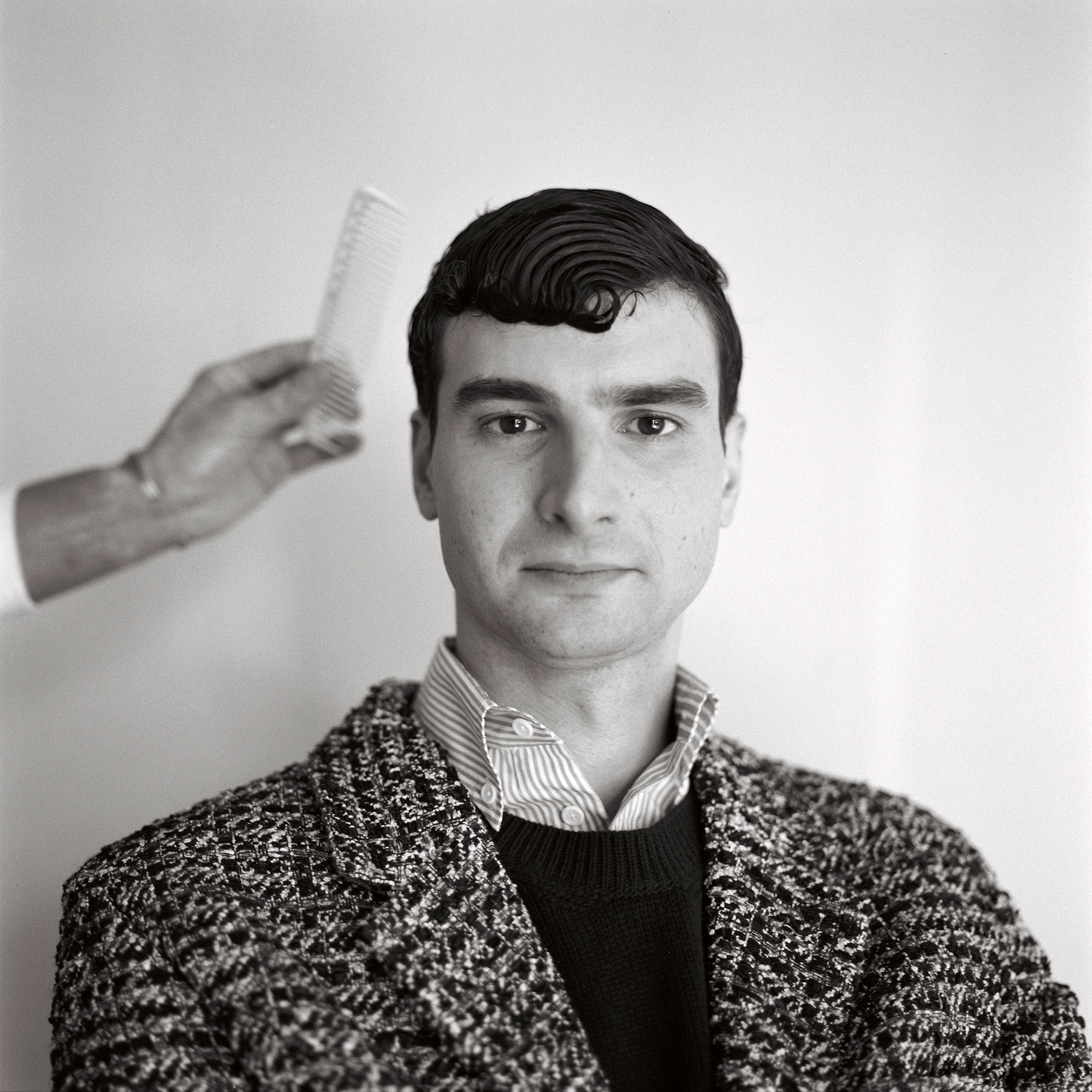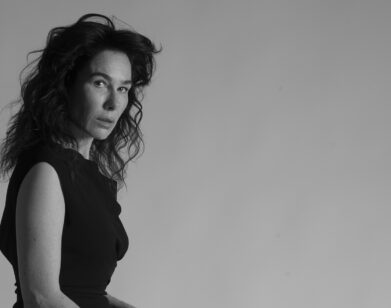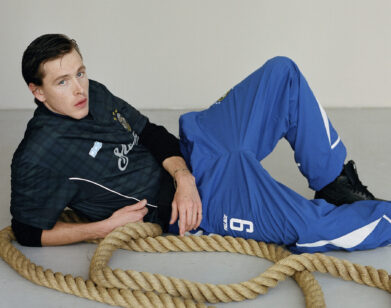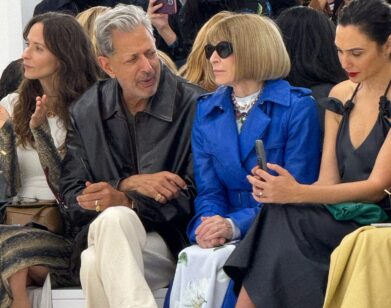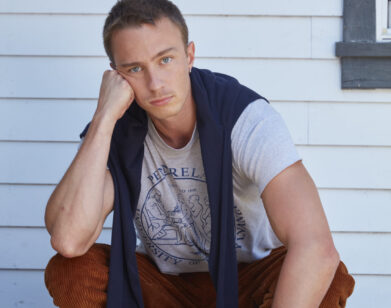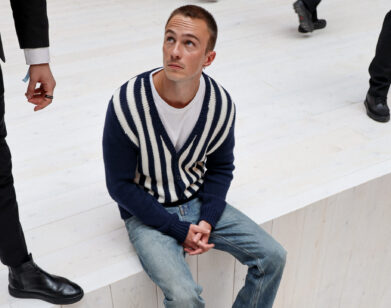SCREENWRITER
What Drove Justin Kuritzkes to Write the Year’s Horniest Movie?
Challengers has it all: charged-up tennis sequences, a wardrobe courtesy of Jonathan Anderson, and a love triangle involving three of Hollywood’s hottest stars. Zendaya plays a tennis player turned coach who helps her husband, played by Mike Faist, overcome a professional rut by pitting him against her ex, played by Josh O’Connor. The Luca Guadagnino-directed movie is the brainchild of New York-based playwright Justin Kuritzkes, who turned an afternoon of watching the U.S. Open into the screenplay for the most anticipated movie of the season. Recently, the Bodies Bodies Bodies director Halina Reijn called up Kuritzkes on Superbowl Sunday to find out how he made it happen.
———
SUNDAY 1 PM FEB 11, 2024 NYC
HALINA REIJN: What time does the Super Bowl even start? I have no clue.
JUSTIN KURITZKES: I have no idea. I don’t know who’s playing, I don’t know anything.
REIJN: I don’t know anything either, but it’s a good place to start since you did make a movie about sports.
KURITZKES: I did, weirdly enough.
REIJN: And I love every minute of it. It is completely unique in tone and genre. You were on set every day,
right?
KURITZKES: I was, and I was for pre-production, which is a real privilege.
REIJN: Because that’s not normal, for writers to be that involved, right?
KURITZKES: Yeah, I knew that, and people would tell me that it was not normal. But because it was my first movie, I had nothing to compare it to. So it felt very normal, especially coming from the theater where the playwright is in the room every day. But it was quite amazing being there and helping Luca execute this crazy visual feat.
REIJN: Were you rewriting during preproduction and production?
KURITZKES: Yeah. We had no real development process because there were only a couple of months between the moment I finished the first draft to the moment we were in preproduction. It was all happening at the same time. So I was rewriting with an eye towards taking something that is meant to be an exciting and meaningful reading experience, and then all of a sudden turning it into a very practical feat that you have to pull off. And you realize that there’s a lot of things you didn’t think about when you were writing it in your room, that now, because hundreds of people are showing up to make this thing, are all of a sudden vital questions that need to be answered.
REIJN: And just to make sure people understand, you wrote this script by yourself, for yourself. It wasn’t like Luca was attached to it when you started writing.
KURITZKES: Yeah, I wrote it on spec, which means that I wrote it with nobody else attached.
REIJN: Can you talk about where the idea to set something in the tennis world, and the love triangle, came from?
KURITZKES: So, I’m not a sports guy. I wasn’t even a massive tennis fan until a few years ago when I happened to turn on the U.S. Open, and it was the final between Naomi Osaka and Serena Williams, where Serena was accused of receiving coaching from the sidelines. It was this big controversy. The ref said that her coach was trying to send her hand signals and communicate with her in the middle of the match, and she was furious about it, saying, “I had never heard of that rule before.”
REIJN: But you can’t do that.
KURITZKES: You can’t do that. And immediately that struck me as this very cinematic dilemma, where you’re playing this incredibly high-stakes match, and there’s this person watching who’s the only person in the whole stadium who understands exactly what you’re going through and for whom the match matters as much as it matters to you. And yet, you can’t say anything to this person. I had this kernel of an idea right then, which was, what if you really needed to have an important conversation with this person? What if there was something the two of you really needed to work out right then?
REIJN: Exactly.
KURITZKES: That made two things happen at once. I started thinking about the idea for this movie, and I also started loving tennis. I was watching it as research, but at the same time, becoming an obsessive tennis fan to the point where it was the only thing that was holding my attention in any meaningful way. I’d try to watch movies and TV shows, and I’d constantly have this feeling in the back of my head, which was, “Why isn’t this as exciting as a tennis match?”
REIJN: So you became completely addicted to it.
KURITZKES: I became a complete tennis freak, because I realized that every moment of a tennis match is full of drama, because it’s a battle, you don’t know what’s going to happen, and the stakes are very clear. So then these two questions got planted in my head, which were, what could I write that would be as exciting as watching tennis? And two, what would make watching tennis even better? And for me, the answer was if I could know precisely what was at stake for each player and for the people watching at every moment; if I had a commentary track in my head where they were telling me exactly why this point mattered. I became obsessed with that.
REIJN: And how do you get from writing it to one of the most interesting directors in the world, and maybe the biggest female star in the world, being a part of it?
KURITZKES: The short answer is Amy Pascal and Rachel O’Connor, who were the first producers on the movie. I got the script in their hands, and they had a relationship with Zendaya because they made the Spider-Man movies together, and they knew Luca had been wanting to find something to do, so they told me they were going to send the script to Zendaya. And I was like, “Okay. Good luck with that.”
REIJN: At that point, did you think it was realistic?
KURITZKES: No. It was my first script, so I had no reason to believe that any of these people would read it, let alone do it.
REIJN: Unbelievable. And how is it working with Luca?
KURITZKES: We had to become very close very fast; we were in the trenches with each other pretty much immediately. I felt very soon after meeting him like he was a comrade, and we spoke the same language, which was useful because what’s difficult about collaboration in general is figuring out how to develop a shorthand. And Luca and I very quickly understood that we could make this work. But yeah, we met on the phone in November of 2021 after he had read the script, and a week later I was on a plane to Milan to start figuring out how we were going to do it.
REIJN: Did you know that he was going to keep you involved like he has?
KURITZKES: No, but I was thrilled that was the process he wanted to have. It speaks to his generosity as a collaborator. There was so much trust between the two of us that it was very easy to work through anything that came up as we were making it.
REIJN: It’s also incredibly luxurious for him to be with someone like you, because that’s the thing with writing: Like you said, everything has to become reality, which means that things are not always possible, no matter how big your budget is. You always have to adjust.
KURITZKES: Yeah. A screenplay is a weird thing in that it’s a literary document in some sense, but it’s also a blueprint for many people to do their jobs. When you’re showing up on set every day, it’s really the process of going from this being something I was writing on my computer, to this being something I was making with Luca. And figuring out how to move the script from something that was meant to make somebody see the movie in their head, to something that could be an instruction manual for people across all these different departments who are going to make the thing real.
REIJN: It’s way more like a practical manual than this creative, vague, mysterious thing.
KURITZKES: Completely. And Luca’s hyperspecific about that sort of thing. So for example, I would often not describe the precise time of day that something was happening, and he would be like, “Well, that needs to be in the script because somebody’s going to have to create that.”
REIJN: Can you tell me a little bit about how you got started? When did you know you wanted to write?
KURITZKES: I started really early. As a teenager, I wrote short plays and I’d do them at my high school. And then I was working as a playwright in New York for 10 years before I wrote a screenplay.
REIJN: How did this process compare to your background in theater?
KURITZKES: The process of making the movie didn’t feel that different from being in rehearsal for a play. We had this really luxurious time period of three weeks before we started production where we were just rehearsing in a room in Boston with the actors and with Luca. That was an incredible way to drop into filmmaking because it felt familiar to me. And the fact that it was these actors didn’t really matter. They were theater kids. That’s what it felt like.
REIJN: Was it immediately like that, or were you starstruck in the beginning?
KURITZKES: No, weirdly. The only person I was truly starstruck by was our tennis consultant.
REIJN: [Laughs] Because?
KURITZKES: Because he’s a bit of a legend in the tennis world. The guy’s name is Brad Gilbert and he was Andre Agassi’s coach, and he coaches Coco Gauff. So yeah, I was starstruck by him, but I have that with athletes generally. Actors don’t really—
REIJN: Do anything for you.
KURITZKES: They do a lot for me. I love them, and I’m mystified by them, but they don’t feel other-worldly to me in the way that athletes do.
REIJN: No, of course. You’ve worked with actors for a very long time.
KURITZKES: Yeah, actors are my species. Athletes are a different breed.
REIJN: I was so impressed by how good the actors were at tennis. I was like, “What the fuck?”
KURITZKES: Well, they were very serious about training, doing tennis lessons every day. And yeah, one of the coolest parts of making the movie was that the actual tennis in the script is connected to the drama of the story in a very direct way, so it was really important that the stakes of the match were communicable to the audience.
REIJN: Exactly.
KURITZKES: So we spent a couple of weeks mapping out each tennis point that gets played with real tennis pros. They would play through the points in the script, and Luca and I would go around with the DP and shot-list the tennis in this practice court with these real tennis pros.
REIJN: That really pays off, because the camera has a whole life of its own when it comes to the tennis.
KURITZKES: The way Luca pulled off the tennis in the movie is a total testament to his mastery.
REIJN: And you guys are working on a second film now. How did that come about and so fast?
KURITZKES: Yeah, it’s called Queer, and it’s an adaptation of the William S. Burroughs novel. It came about from our experience doing Challengers together. One day on set, Luca gave me the book, which meant a lot to him because he had read it at a very formative time in his life. He said, “Read this today and tell me if you think you can adapt it.” I read it that day and I said, “Yeah, I want to do this.” And that was it. It was a very different process than Challengers, which I was writing into a void. Queer I was very much writing for Luca.
REIJN: And also knowing him now, right?
KURITZKES: Completely. I would catch myself in the middle of writing it and go, “No, Luca’s not going to shoot it that way.”
REIJN: How does it feel seeing Celine [Song, Kuritzkes’ wife and the writer and director of Past Lives] go through this wonderful journey of success and awards?
KURITZKES: It’s been incredible to see this person, who I love and who I’ve known has been a great artist for as long as I’ve known her, get recognition.
REIJN: She also comes from a theater background.
KURITZKES: Yeah, we met as playwrights.
REIJN: And this is also her first movie.
KURITZKES: That aspect of it has been incredibly gratifying. Being with another person who does a similar thing is very useful and comforting. You feel a lot less alone going through the life that you have to go through as an artist. There’s a lot of understanding about the rhythms of this life. Neither one of us is ever asking the other, “Why are you just staring at your computer for 14 hours a day?”
REIJN: [Laughs] And how is a normal day when you guys are both writing? Are you together in the apartment? What does that look like? What time do you get up? When do you start? Who does what?
KURITZKES: We’re usually in separate rooms writing, sometimes in the same room. I get up late. We both do. I generally sleep until 11 if I can, and then work really late.
REIJN: Because you like to write when people sleep.
KURITZKES: I like to write whenever it can happen. It’s useful not to have too strict of a routine, because life isn’t going to work out in such a way that you’ll have those conditions when you need them. Especially when you’re making movies, you need to learn how to write in hotel rooms when you come home from set and you’ve got two hours before you’re going to pass out.
REIJN: Do you find it hard to find the work ethic to really do it? Because there’s no boss, especially when you’re writing on spec. How do you start when nobody tells you to?
KURITZKES: Procrastination and laziness are a natural part of any sort of creative life, so I try not to have too much guilt or shame about those things. A lot of the time when you’re “writing something,” you’re not writing it. So a successful day doesn’t necessarily look like cranking out 15 pages of dialogue, because if anything, what you’re doing is giving yourself more writing later when you have to cut all of it. Sometimes a great writing day as a screenwriter is when you realize that the thing you wrote yesterday doesn’t have to be in the movie. I’ve had really fulfilling writing days that are just me realizing I can throw out the past week’s work.
REIJN: Yes.
KURITZKES: A lot of writing, especially screenwriting, is just thinking, and that’s hard to accept when you’re in it, because thinking doesn’t feel as good as typing.
REIJN: Is your phone a distraction?
KURITZKES: When I’m not writing, I’m policing myself about how much I’m on social media, because I don’t like what it does to my brain. But when I am writing, I try to have very little shame or guilt about being distracted because as long as what needs to get done gets done, at the end of the day, it doesn’t really matter if you watched a hundred YouTube videos in between writing scenes.
REIJN: Speaking of YouTube videos, you have this whole past that a lot of people don’t know about. How did you get into that whole YouTube situation? It’s fascinating to me.
KURITZKES: That started in college. I was in the middle of writing a play that was going to be my senior thesis, and I started messing around with the Photo Booth app on my Mac and making strange faces. And being a person who comes from theater, I thought about it like doing mask work or something. I was improvising a character based on a physical change to my face, and I just uploaded the first couple, honestly, for my friends. And then in a very small way, by the standards of YouTube where some people get a billion views a week, my videos did come to mean something for a group of people, and I kept doing them as a way to just never have a consistent brand or identity as a creative person. I liked that they threw a wrench into any hope I had of taking myself seriously as an artist.
REIJN: Okay, so I want to say in closing, and I know in America I have to be very careful, but it’s such a hot movie, as in H-O-T.
KURITZKES: You think you have to be careful about saying it’s hot?
REIJN: I’m so scared in America.
KURITZKES: [Laughs] I think America can handle hot.
REIJN: And the love triangle is amazing. The chemistry is crazy.
KURITZKES: I love hearing that.
REIJN: No, I really am very, very much a huge fan. Even though I’m not completely objective, I still am objective.
KURITZKES: Yeah. Well, that means the world to me. I’m so happy that you found it hot.
REIJN: So hot. I was like, “I got to step it up with my movie.”
KURITZKES: [Laughs] I have no doubt you will.
———
Grooming: Hide Suzuki using Oribe.
Photography Assistant: Henry Crawley.
Fashion Assistant: Sahara Ndiaye.

